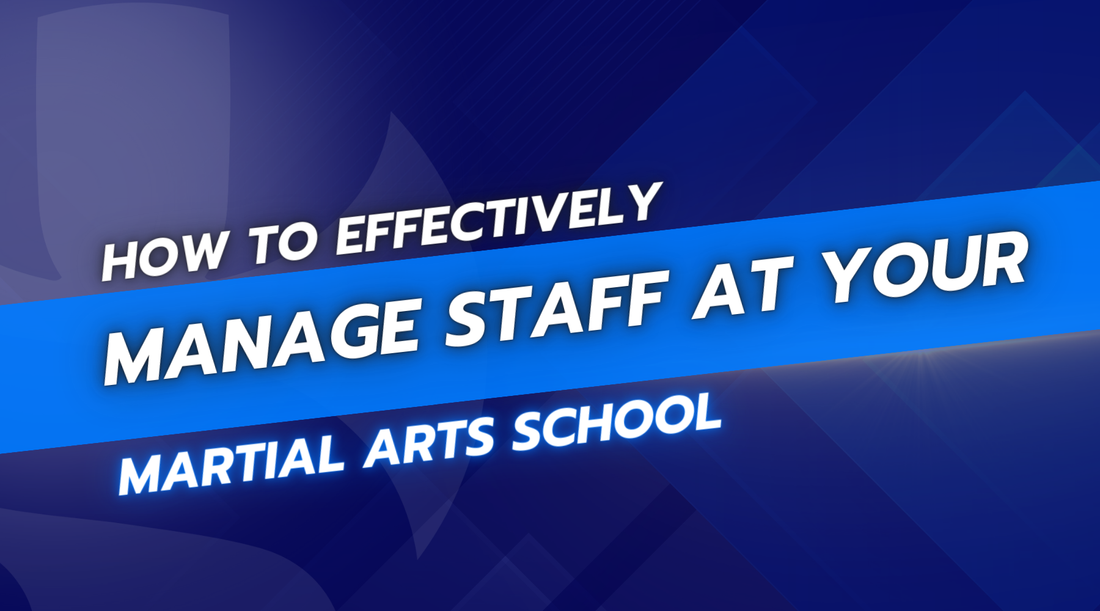
How to Effectively Manage Staff at Your Martial Arts School
Share
Running a martial arts school isn't just about teaching students how to kick, punch, and block. It's also about managing a team of staff who help keep the school running smoothly. Effective staff management is crucial for creating a positive learning environment, maintaining high standards, and ensuring the success of your school.
Understanding Your Role as a Leader
As the leader of your martial arts school, you're more than just an instructor. You're a mentor, a role model, and the person who sets the tone for the entire organization. It's important to lead by example, demonstrating the values and behaviors you expect from your staff. Whether it's punctuality, professionalism, or a positive attitude, your actions will set the standard for others to follow.
Hiring the Right Staff
Finding the right people to join your team is essential. Look for individuals who not only have the necessary skills and experience but also share your passion for martial arts and your commitment to teaching. The hiring process should be thorough, including interviews, reference checks, and practical demonstrations of their abilities. Once hired, ensure new staff members are properly onboarded with a clear understanding of their roles and your expectations.
Creating a Positive Work Environment
A positive work environment boosts morale and productivity. Foster a team spirit by encouraging collaboration and camaraderie among staff. Open communication is key—make sure everyone feels comfortable sharing ideas and concerns. Recognizing and rewarding efforts, whether through formal awards or simple acknowledgments, can go a long way in maintaining a motivated team.
Training and Development
Investing in your staff's training and development is crucial. Provide initial training programs to get new hires up to speed. Offer ongoing professional development opportunities, such as workshops, seminars, and certifications. Continuous learning keeps your staff engaged and improves their teaching skills, ultimately benefiting your students.
Setting Clear Expectations
Clarity is essential in managing a team. Define roles and responsibilities clearly, so everyone knows what is expected of them. Establish performance standards and provide regular feedback to help staff understand how they're doing and where they can improve. This not only helps in maintaining high standards but also in personal growth.
Effective Communication Strategies
Communication is the backbone of effective management. Hold regular meetings to discuss progress, address issues, and plan future activities. Utilize technology to keep everyone connected, whether through email, messaging apps, or project management tools. Most importantly, be an active listener—understanding your staff's perspectives can lead to better solutions and a more cohesive team.
Delegation and Empowerment
Delegation is not just about offloading tasks—it's about empowering your staff. Know when and what to delegate, giving staff members the autonomy to make decisions and take ownership of their roles. Trust your team to handle responsibilities, which can boost their confidence and job satisfaction.
Conflict Resolution
Conflicts are inevitable, but how you handle them makes all the difference. Identify sources of conflict early and address them promptly. Use mediation techniques to resolve issues amicably, ensuring that all parties feel heard and respected. Effective conflict resolution maintains a harmonious work environment and prevents issues from escalating.
Managing Performance
Regular performance reviews are vital for assessing staff progress and identifying areas for improvement. Set clear goals and objectives for each staff member and provide constructive feedback. Handling underperformance with empathy and support can help turn things around, while also maintaining the overall standards of your school.
Maintaining Staff Motivation
Motivation drives performance. Create incentive programs to reward outstanding efforts and celebrate achievements, both big and small. Promote work-life balance to prevent burnout—happy, well-rested staff are more productive and engaged.
Building a Culture of Respect
A respectful workplace is a productive one. Respect diversity and promote inclusivity, ensuring everyone feels valued and accepted. Encourage mutual respect among staff, creating a supportive and positive environment for all.
Adapting to Change
Change is inevitable, whether it's adopting new technologies or adjusting to industry trends. Prepare your staff for transitions and be flexible in your management style. Embrace new ideas and encourage innovation, keeping your school dynamic and forward-thinking.
Legal and Ethical Considerations
Understanding labor laws and ethical management practices is crucial. Ensure compliance with all legal requirements and maintain confidentiality where needed. Ethical management fosters trust and respect, both from your staff and your students.
Final Thoughts
Effective staff management is a multifaceted endeavor that requires dedication, empathy, and strategic thinking. By hiring the right people, creating a positive work environment, and investing in training and development, you can build a strong, motivated team that drives your martial arts school to success. Remember, your staff are your most valuable asset—treat them with respect and support, and they will help your school thrive.
